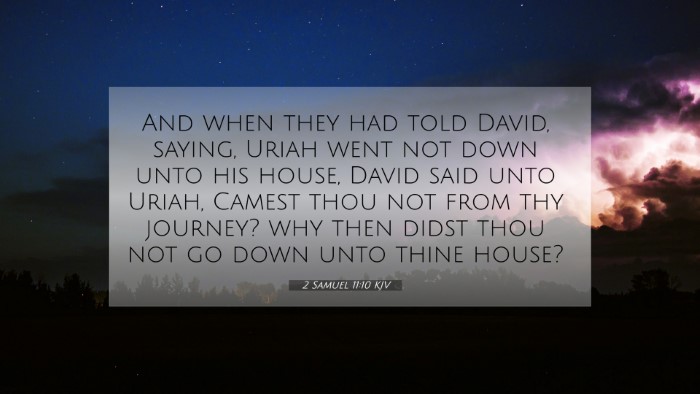Understanding 2 Samuel 11:10
The verse 2 Samuel 11:10 describes a critical moment in King David's life, revealing his deepening involvement in a sinful situation that began with a lapse in moral judgment. Commentators agree that this verse underscores themes of sin, accountability, and the consequences of one's actions.
Verse Context
Before diving into specific commentaries, it is crucial to understand the backdrop of this verse. David, who had previously taken Bathsheba, was informed by Joab about the circumstances of war and the urgency of his leadership. The verse states:
"And when they told David, saying, 'Uriah went not down unto his house,' David said unto Joab, 'Wherefore did you not go down unto thine house?'"
Commentary Insights
Insights from various public domain commentaries shed light on the implications and interpretations of this verse.
Matthew Henry's Commentary
According to Matthew Henry, this verse highlights David’s troubling leadership during a time of war. It reflects a transition in his character from a devoted king to one who was morally compromised. David's questions symbolize an attempt to cover up his sin, showcasing human tendency to avoid accountability.
Albert Barnes' Commentary
Albert Barnes contextualizes this verse within the larger narrative of David's sin with Bathsheba. He notes that David's inquiry into Uriah's behavior reflects his desire to manipulate circumstances to cover his sins. The verse serves as a cautionary tale about how sin leads to further deception and ultimately to ruin.
Adam Clarke's Commentary
Adam Clarke expands on the psychological aspects of David’s sin. He argues that David's insistence on obtaining information about Uriah denotes a deepening moral decay. Clarke also indicates how this scenario shows the disastrous effects of sin, not just on the individual but on the surrounding community and leadership.
Thematic Connections
This verse opens up various thematic connections within Scripture, highlighting the interplay between sin, accountability, and divine judgment. Below are some thematic connections:
- Consequences of Sin: 2 Samuel 12:9-10 discusses the repercussions of David's actions, emphasizing that sin incurs a cost.
- The Need for Accountability: James 5:16 encourages believers to confess their sins to one another, underscoring the importance of community in spiritual accountability.
- God's Judgment: Psalm 51 illustrates David’s repentance, showing that even the greatest leaders must face God’s judgment for their sins.
- Manipulation and Cover-Up: Proverbs 28:13 discusses how covering sins leads to destruction, reflecting David's misguided attempts to conceal his wrongdoing.
- Moral Degradation: Revelations 3:15-16 highlights the dangers of being lukewarm in faith, drawing parallels to David's moral failings.
- Grace and Forgiveness: Ephesians 1:7 emphasizes that God's grace is available even to those who have sinned greatly, as was the case with David.
- Repentance: Luke 15:21 narrates the Prodigal Son's return, a parallel to David's journey of repentance after his sins with Bathsheba.
- Consequences for Leaders: Ezekiel 34:2-4 speaks of the accountability of leaders, mirroring the lessons learned from David's failures.
- Brokenness before God: 2 Chronicles 7:14 expresses the importance of humbling oneself and turning back to God, a relevant lesson from David's experience.
- The Human Heart's Deceit: Jeremiah 17:9 reveals the deceitfulness of the heart, a reminder of how easily one can fall into sin as demonstrated in David’s life.
Cross-Referencing Related Verses
The following verses are vital for cross-referencing and understanding the implications of 2 Samuel 11:10:
- 2 Samuel 12:1-15: God's confrontation with David through Nathan, highlighting the consequences of his sin.
- Psalm 51: David's penitential psalm that expresses his regret and plea for mercy after his sin.
- Romans 3:23: “For all have sinned, and come short of the glory of God,” acknowledging universal human sinfulness.
- Ezekiel 18:30: Calls for repentance and turning from iniquity, paralleling the need for accountability.
- 1 John 1:9: Assurance of forgiveness upon confession, showing God's readiness to forgive the repentant heart.
- Proverbs 6:32: Discusses the folly and consequences of adultery, relevant to David's specific sin.
- Galatians 6:7: Teaches about sowing and reaping, reflecting on the principle that one will face repercussions for their actions.
- 2 Corinthians 7:10: Differentiates between godly sorrow that leads to repentance and the sorrow of the world that leads to death.
- Luke 19:8: Zacheus' declaration of repentance, echoing the joy that accompanies repentance.
- Matthew 7:1-5: Speaks on judgment and self-examination, ties into the theme of accountability and integrity.
Conclusion
2 Samuel 11:10 serves as a significant reminder of the human propensity to sin and the far-reaching consequences that stem from individual actions, especially for those in positions of authority. By examining various public domain commentaries, one can appreciate the depth of this verse and its ongoing relevance in the lives of believers today. Through cross-referencing correlated verses, readers can gain a comprehensive understanding of God's perspective on sin, accountability, and the hope of repentance.


